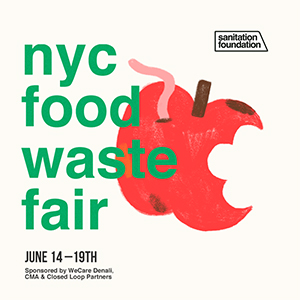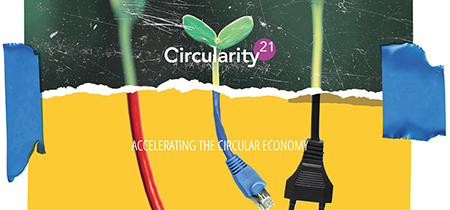Nora Goldstein
June isn’t just for weddings apparently. It’s also a month for New York City (NYC) to host a Food Waste Fair, the U.S. Composting Council (USCC) to kick off its Composters’ Conference on Compostable Products, and GreenBiz to schedule a composting session at Circularity21. The NYC Food Waste Fair includes both in-person and virtual events. The other two are virtual only.
NYC Food Waste Fair, June 14-19
 The 2021 NYC Food Waste Fair is organized by the Sanitation Foundation, the official nonprofit organization of the New York City Department of Sanitation. The 2021 fair — June 14-June 19, 2021 — builds upon the NYC Food Waste Fairs held in 2017 and 2019. The complimentary week-long series of virtual and in-person events to end food waste brings together policymakers, innovators, thought leaders, and community members.
The 2021 NYC Food Waste Fair is organized by the Sanitation Foundation, the official nonprofit organization of the New York City Department of Sanitation. The 2021 fair — June 14-June 19, 2021 — builds upon the NYC Food Waste Fairs held in 2017 and 2019. The complimentary week-long series of virtual and in-person events to end food waste brings together policymakers, innovators, thought leaders, and community members.
The keynote on June 14 is Mi Keong Lim, Director of the Living Environment Division of the Climate and Environment Headquarters with the Seoul (Korea) Metropolitan Government. “We were inspired to reach out to South Korea after reading an article in the March 2, 2020 issue of the New Yorker, ‘South Korea has made tremendous strides in managing their food waste,’” explains Julie Raskin, Executive Director of the Sanitation Foundation. “I do think New York can learn from some of their successes.”
According to the New Yorker article, a law passed in South Korea in 2006 “made it illegal to send food waste to landfills and dumps; citizens were required to separate it out. The 13,000 tons of food waste produced daily now become one of three things: compost (30%), animal feed (60%), or biofuel (10%).”
Virtual panel discussions cover a host of topics, including Cities Leading the Fight Against Food Waste; Creating a Waste-Free Restaurant Culture; Scaling & Sustaining Food Waste Solutions — Planning for Beyond the Pandemic; Farming, Food Waste, and Eating Sustainably; Strategies for Reducing Food-Related Plastics & Packaging; Upcycling: Food Waste as Opportunity for Innovation & Entrepreneurship; and Food Waste Policy Action: Setting & Reaching National Targets on Food Waste.
In person events include tours of two community composting facilities:
- June 14: Earth Matter NY’s Compost Learning Center and the Zero Waste Island Initiative on Governors Island in New York Harbor. Earth Matter receives 15,000 lbs+/week of NYC residential food scraps that are dropped off at GrowNYC farmers’ markets, along with Governors Island organics, generated by island visitors and vendors. It blends these organics with the Island’s horticultural materials such as leaves, twigs, and weeds. Compost is used on the island.
- June 17: Lower East Side (LES) Ecology Center Compost Site Tour in Manhattan. The NYC Compost Project hosted by the LES Ecology Center operates a one-acre facility at the East River Park Compost Yard. The site is located within the 57-acre East River Park (as the name implies, the park is adjacent to the East River on the Lower East Side of Manhattan). In 1998, the Ecology Center moved its composting operation from a community garden space on the Lower East Side and made a home in East River Park. As one of Manhattan’s largest composting facilities, the site takes in nearly one million pounds of organic waste annually with materials coming from local food scrap drop-off sites, wood shops, and chipped park waste.
The other in-person events involve food rescue and recovery. On June 14, Rescuing Leftover Cuisine in partnership with DonateNYC will be doing a food rescue at a bakery on the upper East Side of Manhattan and delivering an estimated 115 lbs of baked goods to a church food pantry. June 15 is volunteer day at the City Harvest Mobile Markets; City Harvest delivers fresh fruits and vegetables, free of charge, to thousands of New Yorkers each month. Community members gather in farmers’ market settings, where they receive fresh produce and non-perishable items.
Conference On Compostable Products,
June 17, June 22 & July 15
The USCC organized the virtual Composters’ Conference on Compostable Products to educate compost manufacturers about the pros and cons of accepting or rejecting compostable products in their feedstocks. The event, which includes two deep-dive workshops and a closing summit, also is designed to educate other stakeholders in the Compostable Product Supply Chain about the issues compost manufacturers face in accepting compostable products and how they manage them.

Workshop 1 on June 17 (2:00-4:30 PM EDT),”What Does It Mean To Be Compostable?”, discusses the basics for certification, the history of compostables, and the current state of the industry. Speakers include Rhodes Yepsen, BPI; Dr. Ramani Narayan, Michigan State University; Norma McDonald, OWS; and Leslie Rogers, Atlas Organics. They will provide societal, historic, scientific, and compost operator perspectives.
Workshop 2: Reducing Contamination is on June 24 from 2:00-4:30 PM EDT. USCC is billing this session as “education by composters for composters” with a focus on managing compostables and avoiding contamination before it gets into the compost. Speakers have experience working with haulers, collectors and diverters, field testing, and preprocessing materials at compost manufacturing facilities. They include Wayne Koeckeritz, EcoProducts; Erin Skelly, Shakopee Mdewakanton Sioux Community Organics Recycling Facility; Alex Thomas, Compost Manufacturing Alliance; and Emily McGill, BSIbio.
The conference wraps up with a Summit on July 15 from 2:00-4:30 PM EDT with the theme, How Do You Decide? Panelists will discuss the pros and cons to accepting compostable products. The summit starts with a presentation on a new decision-making tool being developed for the USCC by BioCycle Associates. The tool features a series of worksheets that will assist compost manufacturers as they assess whether to accept compostable products. The summit will end with a wrap-up of BPI’s roadmap and action plan presented by Rhodes Yepsen, and the future of compostables as seen by the USCC’s Corporate Compost Leadership Council with Advocacy Director Linda Norris-Waldt.
The fee to attend the workshops and summit is $65 for USCC members and $195 for non-members. Registrations also are being sold for sessions individually.
CIRCULARITY 21, June 15-17, 2021
 Circularity21, June 15-17, is among the largest conferences focused on the circular economy. Sponsored by GreenBiz, virtual session tracks cover business innovation and strategy, next-gen products and packaging, rethinking supply chains, people and policy, and bio-based solutions. On Wednesday, June 16 at 2:00-2:30 PM EDT, the Bio-Based Solutions track features a session, The Need for National Composting. Panelists include Ryan Cooper, Rubicon; Nora Goldstein, BioCycle; Jorge Montezuma, Atlas Organics; and Michelle Tulac, Ellen MacArthur Foundation.
Circularity21, June 15-17, is among the largest conferences focused on the circular economy. Sponsored by GreenBiz, virtual session tracks cover business innovation and strategy, next-gen products and packaging, rethinking supply chains, people and policy, and bio-based solutions. On Wednesday, June 16 at 2:00-2:30 PM EDT, the Bio-Based Solutions track features a session, The Need for National Composting. Panelists include Ryan Cooper, Rubicon; Nora Goldstein, BioCycle; Jorge Montezuma, Atlas Organics; and Michelle Tulac, Ellen MacArthur Foundation.
The session description highlights that of “over $408 billion of food in the United States, more than a third of what we produce annually is wasted. Reinvesting just $14 billion in solutions to the U.S. food systems could save 45 million tons of food waste, 4 trillion gallons of water and 75 million metric tons of emissions. From corporate to city-scale action, what are the solutions we need to prioritize to decrease food waste, and what leverage points in our food system are rife with opportunity?”
One of those opportunities in a circular economy is composting.










